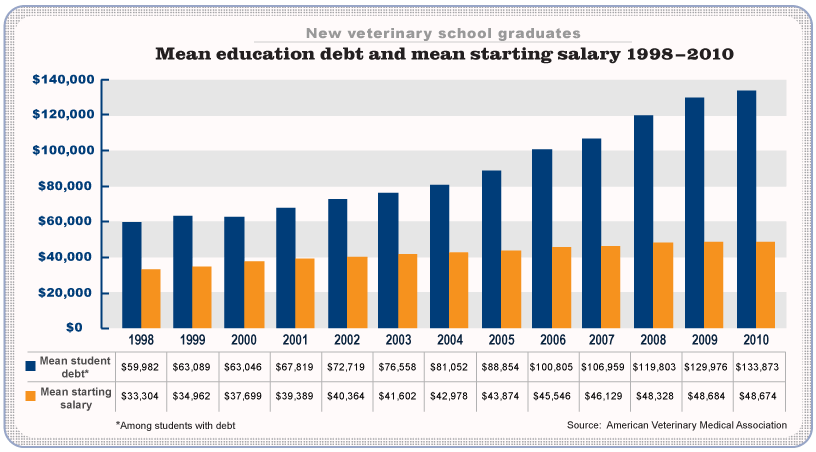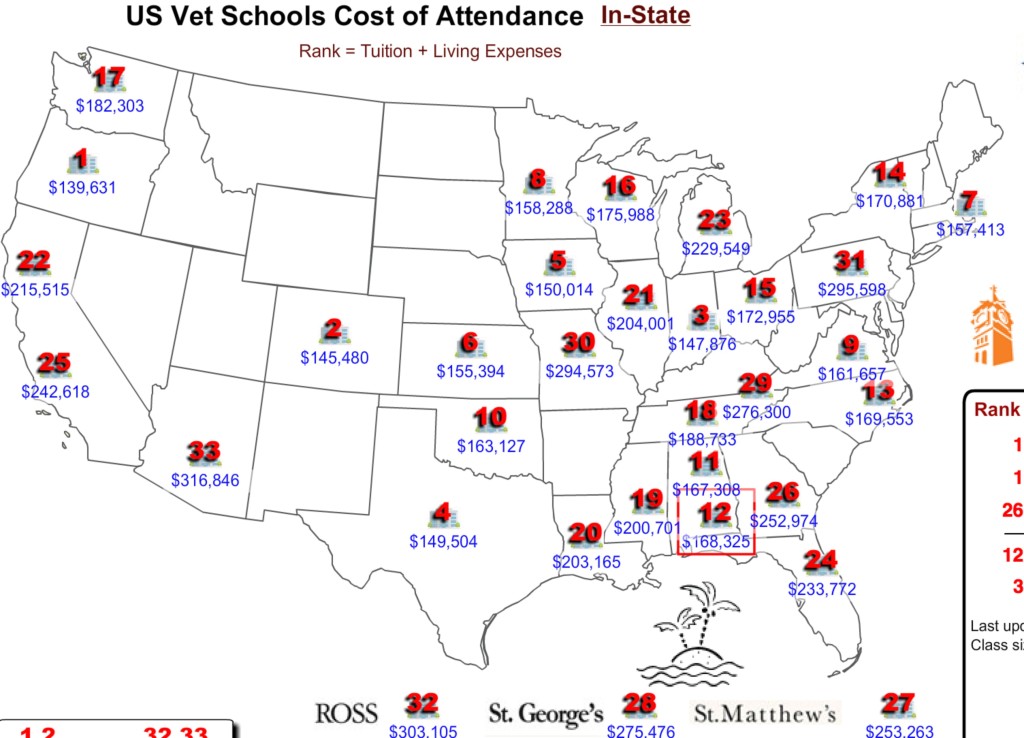Please share far and wide because we only have until Monday to get our voices heard.
Dear veterinarians,
I imagine you have noticed things have changed a bit for us in the last ten years or so. A decade ago, you could look in the “Help Wanted” section on VIN or AVMA classifieds and have your pick of positions. This is good, since most of us carried modest student debt we needed to pay off. Being a new grad was exhilarating, a little nerve-wracking, but thrilling. Now?

The Changing Landscape
Three things have happened that have dramatically changed the landscape for new grads, leaving them nervously optimistic at best and apprehensively regretful at worst:
1. The economy tanked.
Vet visits are down, and clinics are responding by tightening their belts. Job openings have dwindled.
2. Educational costs have skyrocketed.
I know we have all heard this, but have you really read the numbers? In-state tuition at my alma mater has doubled since I graduated. The average vet student now graduates about $150,000 in debt; some students are racking up debt as high as $500,000. To live comfortably- not extravagantly, I mean comfortably- your debt should not exceed an average starting year’s salary, which hovers around $64,000 in our field. We’re off by over double, and in many cases far more.

This is compounded by the fact that a change in student loan policies in 2007 allowed students in professional schools to borrow whatever amount they needed, no cap, assuming doctors and lawyers and dentists would earn enough in the future to make short work of the added debt. But in our field, the numbers just don’t add up.
3. Despite fewer jobs and higher debt, new veterinary schools continue to open.
Why? After a threatened lawsuit brought by Western University against the AVMA Council on Education in the early 2000s, the accreditation process was relaxed to allow new institutions to become accredited without the added expense of building a teaching hospital. Instead, schools could use local veterinarians to provide clinical experience, which made the cost of opening a new vet school suddenly doable. (Please note, I’m not presenting an opinion on whether or not the quality of education differs- the Western grads I know are fantastic- simply presenting the history.)
Given how much money prospective vet students are willing to pay, this is a very lucrative proposition for private institutions such as Lincoln Memorial, or Midwestern, two new schools opening this year. At some private institutions, expected costs of attendance are reaching over $300,000.

More grads, fewer job choices, more debt. Sounds great.
The New Law School
It is no secret to those paying attention that veterinary school is being viewed as the next law school, that horrible disaster we’ve all read about, except- ugh- worse. The market fixes itself, economists argue, when prospective students see new grads flail and sink and stop applying, like that happened with dental school. So, you know, sacrifice a generation or two and it’ll be ok.
Except vet students don’t do that, because there is an emotional pull to this field that dentistry and law simply don’t have. Knowing the debt, and knowing the fact that things will be hard, vet school applications are still up. Will they regret it ten years later when it’s too late to change their mind and they are still living in an apartment because they can only find a 30 hour a week job? I guess we’ll find out.
Can we do anything about it?
Other than the aforementioned ‘let a few drown’ approach, I mean. I have read many practitioners state, “Their fault, too bad, sucks to be them,” and I can’t tell you how sad that makes me. Don’t we want to do better by our future colleagues than shrugging?
VIN has tried, by attempting to educate prospective vet students on the costs of education. Life with that amount of debt is not sunshine and roses. There’s nothing wrong with telling someone the truth about what that can mean for your life; if they choose to take it on anyway, that’s fine, but at least we presented them with realistic scenarios.
And what about the American Veterinary Medical Association, the “collective voice for its membership and for the profession”? Would it be a good idea for this organization to take a good hard look at the impact of these changes and attempt some proactivity in speaking out about the impact of these new schools?
So far, the response has been, “not our job, not our job, not our job.” Then what is? (Aside from making movie theater trailers.)
Accreditation and the AVMA
The AVMA Council on Education is responsible for accrediting new schools. If you’ll remember our history lesson from Part 1, this whole debacle started when the Council hesitated to grant Western a reasonable letter of assurance for accreditation and they threatened to sue. The AVMA cannot act in a protectionist way because as an accrediting body, it’s a conflict of interest to their neutral evaluation of new schools.
But they should, dangit. They should protect this profession. Not from the influx of new grads. FOR the new grads.
And the only way to do that is to completely sever the tie between the COE and the AVMA so they can function independently.
Take Action!
Every five years, the US Department of Education reviews an accrediting program and decides whether or not to renew its status. If you are an AVMA member, you received an email this morning letting you know this is the year, and asking you to write a letter to the NACIQI stating your support for maintaining the status quo. But I have a different letter to present to you:
Sign the Letter Now
We know where we are headed in terms of the status quo. The scattered corpses of lawyers and dentists line the way. We can do better.
You can submit a different letter, one asking the NACIQI to seriously consider the relationship between the AVMA and the COE, here. For more information about what I’ve written, check out the Resources page.
Sincerely,
Just another non-high-level-leadership peon who loves this field and wants the future to love it too






I’ve felt the same way about all the new vet schools popping up for some time and wondered why the AVMA continued to accredit more. I finally reached a point where I talked with some AVMA folks about it who explained the issue. The unfortunate problem is that the COE isn’t allowed by the Dept. of Education to deny accreditation of a school that meets all the necessary criteria. As much as they may like to keep the number of schools down by denying accreditation, doing that to an otherwise qualified institution would be discriminatory and put their status as an accrediting body at jeopardy. Regardless of whether the AVMA COE or another agency are running the process this won’t change. My concern is if the AVMA isn’t in control of the process, who will be? Can we be so sure another agency wouldn’t make the situation worse?
That makes sense, and I understand the COE’s role in this and why they cannot say no. On the other hand I think AVMA should be able to take a more active voice in expressing how this affects the profession, and as long as the two are related that cannot happen. As to whether it’s the COE’s role to accredit foreign schools, well that’s another can of worms entirely.
Again, the COE can say no. The AVMA tells them not to. Why is that? And since the COE is supposed to be independent from the AVMA why is the AVMA talking for the COE anyway?
I guess I wasn’t clear, they cannot say no simply because we don’t need more schools, if a school meets all of the accreditation standards otherwise. The fact that they haven’t been saying no to anyone, that all of a sudden everyone seems to fit all of the requirements, troubles me. When I was at Davis we were put on limited accreditation because our facilities were not up to par (and to be clear I am very glad that happened, because it gave the University of California the push it needed to invest in our infrastructure.) Yet not four years later Western was accredited without a teaching hospital at all.
Thanks for the clarification. It doesn’t change my comment. The AVMA-COE is supposed to be independent from the AVMA and AAVMC just as in human medicine the LCME is independent from the AMA and AAMC. But in veterinary medicine it isn’t the COE’s attorney that is giving this bogus legal opinion, it is the AVMA attorney providing it and dictating the COE’s actions. This is a conflict of interest.
What is more the AVMA says they can’t say no if a school meets standards, but the standards are now being applied unevenly. A school that has gone to the trouble of having a full teaching hospital could lose accreditation if the COE doesn’t approve of some aspect of the teaching hospital while some schools simply have no teaching hospitals at all. There is no longer an even playing field. So the AVMA using the excuse of having to apply their standards evenly is a farce on two levels: first they aren’t applying them evenly, and second they shouldn’t be involved. The COE should be truly independent in its operations from the parent organizations just as the LCME is in human medicine.
This is actually a lie put forth by the AVMA. The LCME, the human medical school accrediting body won’t accredit for profit and foreign schools and they don’t get sued. VIN spent a lot of money to get an independent legal opinion that verified the AVMA was propogating untruths. Now that the AVMA has blatantly lied to you are you still so trustING of them? Veterinary schools should be accredited by an independent body the way human medical schools are
Couldn’t the AVMA change accreditation regulations to REQUIRE schools to have a teaching hospital?